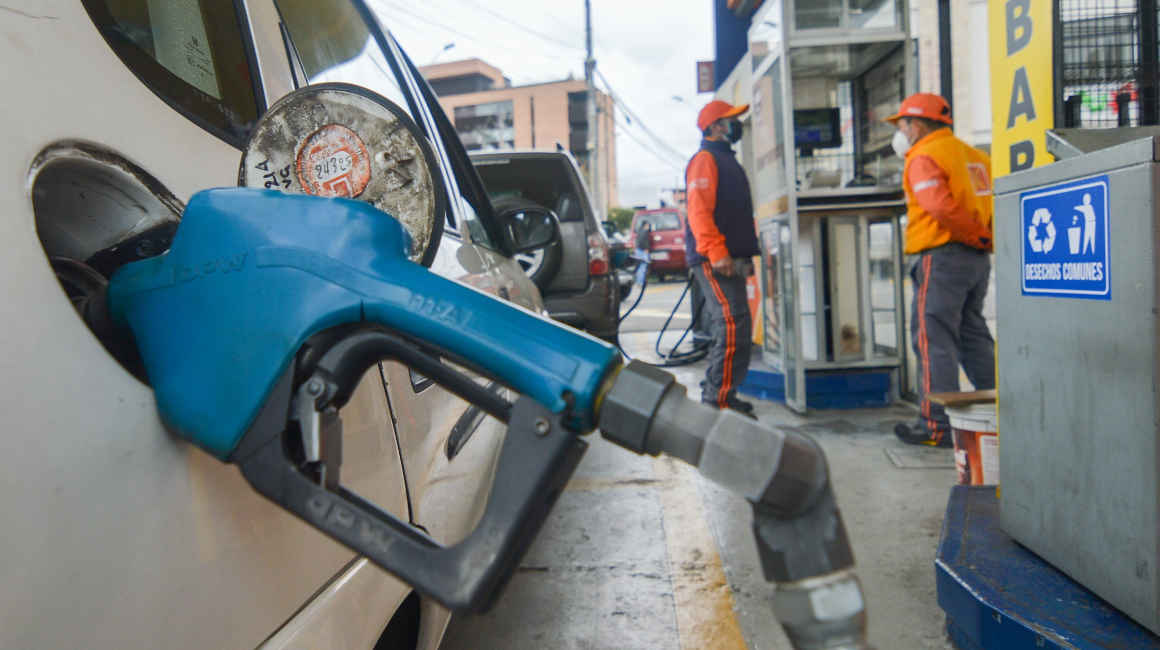The World Bank warns that widespread subsidies cause inefficient use of resources and harm fiscal stability.

Reference image of a gas station in Cuenca, July 2022.
Economic growth has remained “elusive” in the last ten years for Ecuador, leading to an increase in poverty and a deterioration in the quality of employment, warns the World Bank in its new report Ecuador, resilient growth for a better future.
According to the multilateral, the low economic growth is due to the fact that, before 2014, during the oil price boom, growth was based above all on an “unsustainable expansion of public spending”.
“During a period of strong growth and high oil prices, Ecuador dismantled its sovereign oil funds, accumulated new debt and defaulted on old debt, to fund a broad public investment program,” according to the report presented on May 30, 2024.
The document also highlights that today the medium-term economic and social benefits of this large public investment program “seem limited.”
Order in public accounts to get out of stagnation
Therefore, the World Bank considers that for Ecuador to reduce poverty and improve its economic growth, it is necessary for the private sector to become the driving force of the country, for which it recommends three actions:
- Maintain a sustainable fiscal path.
- Eliminate the rigidity of policies that affect the private sector, including labor policies.
- Develop the potential of three sectors: mining, agriculture and tourism.
Achieve fiscal sustainability; That is, reducing the deficit in the Budget is key, because without that, there can be no sustainable economic growth, says the World Bank.
The deficit occurs when a State has expenses that exceed its income. As a consequence, governments have to go into debt.
And Ecuador has had to pay high interest rates to obtain loans due to its fiscal deficits, which affects the possibilities of increasing private and public investment.
So says Oscar Calvo-González, director of the equitable growth, finance and institutions practice of the World Bank for Latin America and the Caribbean.
The World Bank report recognizes that some measures have been taken in recent years, since the fiscal deficit was 9.8% of the Gross Domestic Product (GDP) in 2016 and by 2022 it was reduced until reaching almost a balance between income and expenses.
However, the reduction in public spending caused social unrest and was not compensated by the private sector.
Hence, the deficit has increased again and economic growth remains stagnant. By 2024, the fiscal deficit is projected at 4% of GDP.
In the area of fiscal sustainability, the multilateral warns that the country will face important challenges in the short term.
Among them, he mentions the pressures of spending to control the worsening of insecurity and to face the consequences of the El Niño Phenomenon, including the current drought.
The multilateral indicates that, due to the drought, Ecuador will probably reduce hydroelectric production, which will force the country to import more electricity from Colombia.
And other fiscal challenges outlined by the World Bank for Ecuador are:
- Cut tax expenses.
- Guarantee the sustainability of social security.
- Contain the growth of the public wage bill.
- Reduce fuel subsidies and protect vulnerable people.
“Subsidy spending is a vestige of the past”
Spending on fuel subsidies has been discussed in the country since early 2024, when President Daniel Noboa announced that his government is analyzing a strategy for targeting the gasoline subsidy.
Noboa even said that the targeting will be progressive and that it should begin in the second quarter of 2024. However, as of May 29, the mechanism has not yet been announced.
The World Bank already warns in its report that the lack of consensus has been one of the problems that has prevented Ecuador from launching actions regarding fuel subsidies.
For Calvo-González, widespread subsidies ” are a vestige of the past,” which has caused an inefficient use of resources.
And he adds that the problem with generalized subsidies is that “there are people who do not need them and receive them.”
“Generalized subsidies are vestiges of the past, they arose at times when there was a shock and an attempt was made to protect the population. At that time the only way to confront that was with an indiscriminate subsidy,” says Calvo-González.
Calvo-González adds that now that Ecuador has put this issue on the table, you can see instruments from other countries that have already moved to targeting subsidies, to protect the most needy population.
The labor market is very rigid, says the World Bank
For the private sector to become the driver of Ecuador’s growth, the World Bank says labor market rigidities must be eliminated.
Although labor law in Ecuador allows about 40 types of contracts, only a few are widely used, the report says. And he mentions among the rigidities:
- Hourly contracts, subcontracting of intermediaries and fixed-term contracts are prohibited.
- Casual contracts have a 35% surcharge and the trial period for new employees has been reduced from 12 months to 90 days.
- Ecuador also has one of the highest dismissal costs in the region, imposing 32 weeks of salary.
The report also says that Ecuador has the second highest minimum wage in the region as a percentage of GDP per capita.
As a result of these rigidities, the multilateral says that today more than half of employees earn less than the minimum wage. “This most affects vulnerable workers, including young people, people with a medium educational level and the poor in the primary, unskilled services and construction sectors,” according to the document.





